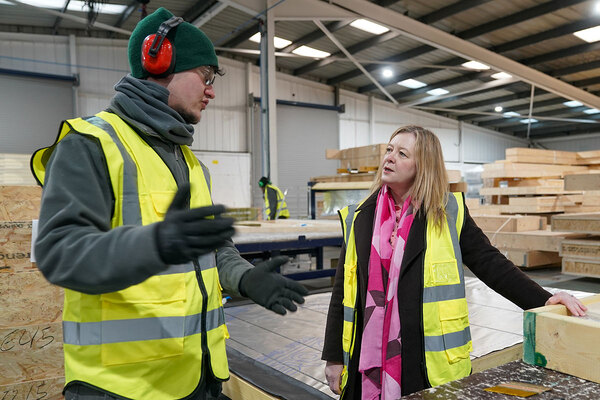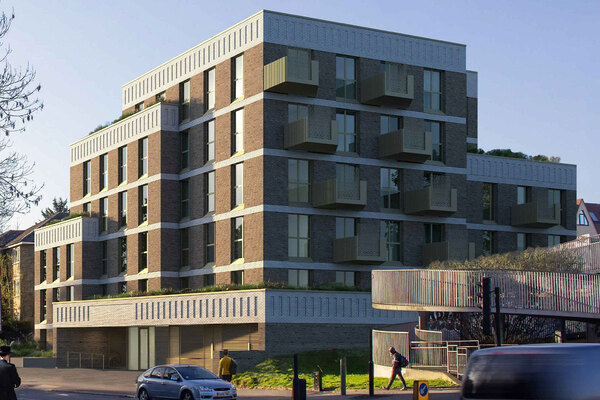You are viewing 1 of your 1 free articles
Housing ministers come and go, but we must always fight our corner
Housing ministers have arrived and disappeared at an alarming frequency in the past decade. In this whistle-stop tour of previous incumbents, David Montague offers some perspective and warns that the sector will once again have to make its case
As Boris Johnson enters Number 10, is this the next chapter in an evolving story or a completely new book?
Can we pick up where we left off, or are we back to the drawing board?
During my 11 years as chief executive of L&Q I have lost count of the number of prime ministers, secretaries of state, housing ministers, shadow ministers, government departments and mayors we have worked with. I guess it is true that change is the only constant.
In my first year as chief executive I remember meeting Yvette Cooper, then housing minister. Along with a group of fellow chief executives we went to her office to complain about something in the housing bill.
She ran rings around us, knowing infinitely more about everything than the rest of us put together. We left with nothing, not even our dignity.
After Yvette Cooper, Caroline Flint and Margaret Beckett came and went pretty quickly. Then, along came John Healey, someone who was passionate about housing, who believed in housing associations and wanted to support us. In return he demanded greater efficiency and a better service – not a bad deal.
Then everything changed.
The banks crashed, the economy tanked. But Gordon Brown and Mr Healey backed us with record levels of investment to keep Britain building. Then, in those famous last words, the money ran out, and so did time.
Along came David Cameron, George Osborne, Eric Pickles, Grant Shapps and the age of austerity in 2010. Amid a relentless government focus on homeownership, housing associations felt like they were left out in the cold. Social housing was out of fashion. Funding was slashed, rents were cut, relationships became more adversarial, and for a while it felt like we faced an existential crisis.
Mr Shapps and Mr Pickles wanted greater transparency, for our social housing tenants to become armchair auditors.
“Mark Prisk left and Kris Hopkins arrived. We put the kettle on to start a new relationship but he left before the kettle boiled”
Every housing association, they insisted, should publish every expense more than £50.
In return they offered to halt extending the Freedom of Information Act to housing associations.
Either way, we faced a bureaucratic nuisance.
We wanted transparency, but we wanted it to be useful, comparable, easy to access. The sector dug its heels in and relations got worse.
Mr Shapps and Mr Pickles moved on and Mark Prisk arrived. A fresh start, a minister with a property background and a more pragmatic approach. We had a chance to rebuild trust and confidence. Then Mr Prisk left and Kris Hopkins arrived. We put the kettle on to start a new relationship but he left before the kettle boiled.
Brandon Lewis, a man that liked doing deals, took charge and was handed the Voluntary Right to Buy.
Stuck with what seemed an undeliverable manifesto commitment, battle lines were drawn and whichever way we turned we upset someone. Lewis didn’t like targets, but he liked building.
If you are investing in communities and building homes, he would say, I have no problem with that. But if you are not building homes, I have a problem.
Housing associations found themselves classified as public sector bodies, and we speculated whether it was car crash or conspiracy. In dark corners, whispers were heard of the sector’s ‘five to midnight’ moment.
Then the referendum saw Mr Cameron resign and Theresa May take on the unenviable job of delivering Brexit.
Brandon Lewis handed over to Gavin Barwell. The prime minister made a personal commitment to fixing the broken housing system, to help those who were just about managing. Mr Barwell built bridges across the sector. Ms May reclassified us as private sector and gave us rent certainty. Things were looking up.
Then Grenfell changed everything, and Alok Sharma found himself in charge.
It must have been a profound shock to him, as an accountant by trade, meeting so many people whose lives had been destroyed by the fire, and even more whose trust had been destroyed as well.
But he showed empathy, he listened, and backed by Ms May we started to see a shift of emphasis. Safety, quality and volume were all important, but in that order.
Just as Mr Sharma was getting his feet under the desk, Dominic Raab arrived in town, but then left before sundown.
And that brings us to Kit Malthouse, and his “more, better, faster” mantra.
A noble mantra, but economic uncertainty led to lower sales, lower sales led to lower cross-subsidy. And this combined with a need to invest in safety and quality reduced capacity to invest in new homes.
Now as Mr Johnson enters Number 10, a new cabinet, a new chapter, a new direction begins. (Last week Esther McVey was confirmed as housing minister).
For those of us who have been around for a while, it would be tempting to feel like the sector is on a hamster wheel.
“Gavin Barwell built bridges across the sector. Theresa May reclassified us as private sector and gave us rent certainty. Things were looking up”
Once again we will have to make the case for social housing. Once again we will have to make the case for greater investment. Once again we will have to explain the housing association model and deal with concerns regarding efficiency and balance sheet capacity.
It would be tempting to grumble, but telling our story, fighting our corner, is part of the job.
Having worked with Mr Johnson when he was mayor, I believe that he gets the value that housing associations bring. His advisors get it, too.
I hope that Mr Johnson will recognise the enormous potential that housing associations offer at times like these, and that the current strategic partnership model can evolve into genuine long-term, open-book partnerships between all providers both public and private, allowing us to share risk and reward, build across economic up and downturns, drive economic growth and deliver a step change in supply.
I hope that Mr Johnson will listen to Sir Oliver Letwin, who recently had his own eureka moment. The problem, he said, is absorption. Builders will only build what they can sell; the answer is variety – variety of providers, variety of tenures.
Political will and economic fortune will ebb and flow but housing need is here to stay. Families won’t form, the next generation won’t be able to afford a place of their own. The last generation won’t be able to afford to retire. Communities will fracture and resentment will grow. Unless we do something about it.
As I step down from the board of the National Housing Federation after six amazing years, I know that the body will continue to carry the torch for all housing associations.
But it is our future and our responsibility to engage and deliver. Under this government and the next government, as politicians and economic cycles come and go, we are here for those people the market fails. Let us not fail them.
David Montague, chief executive, L&Q











